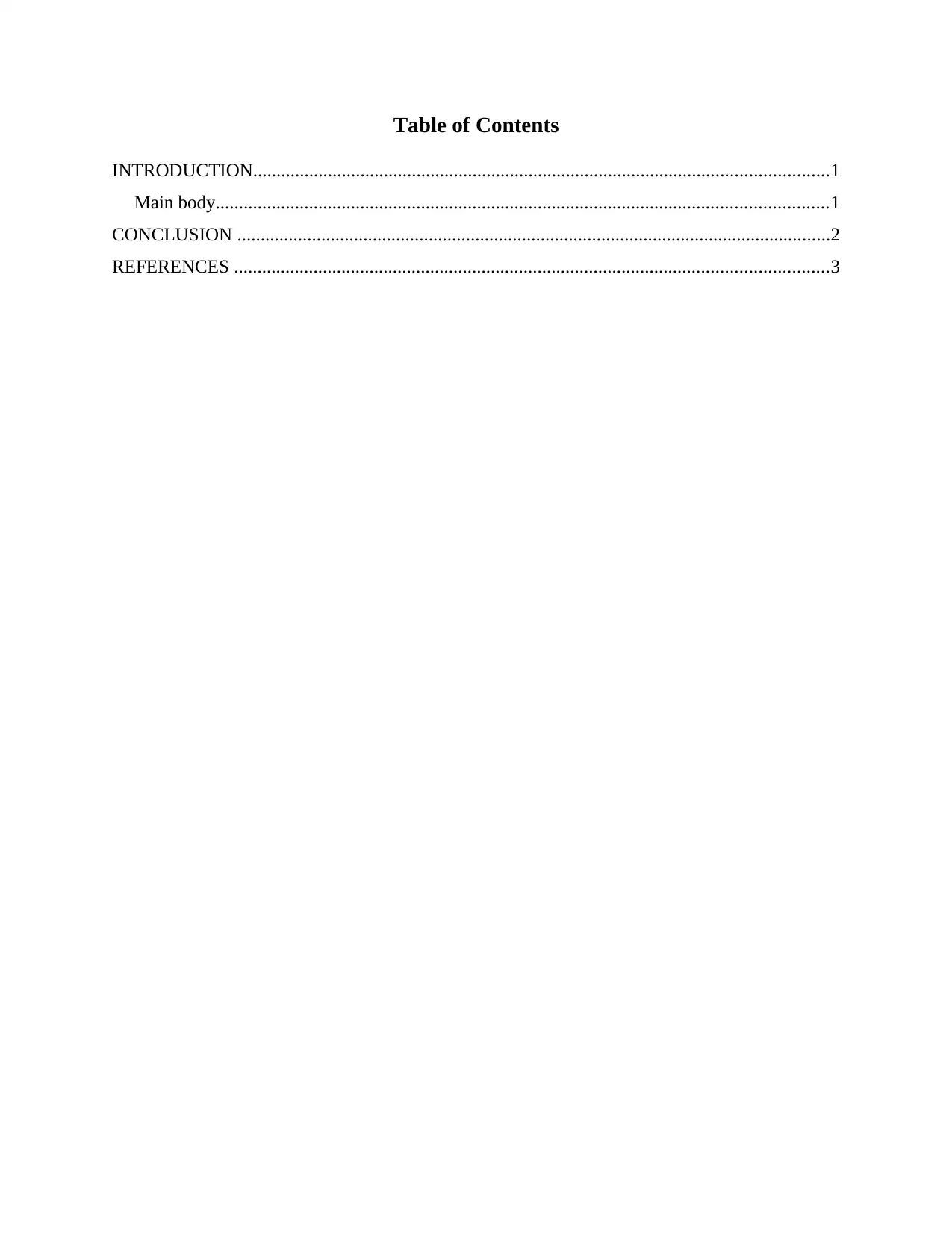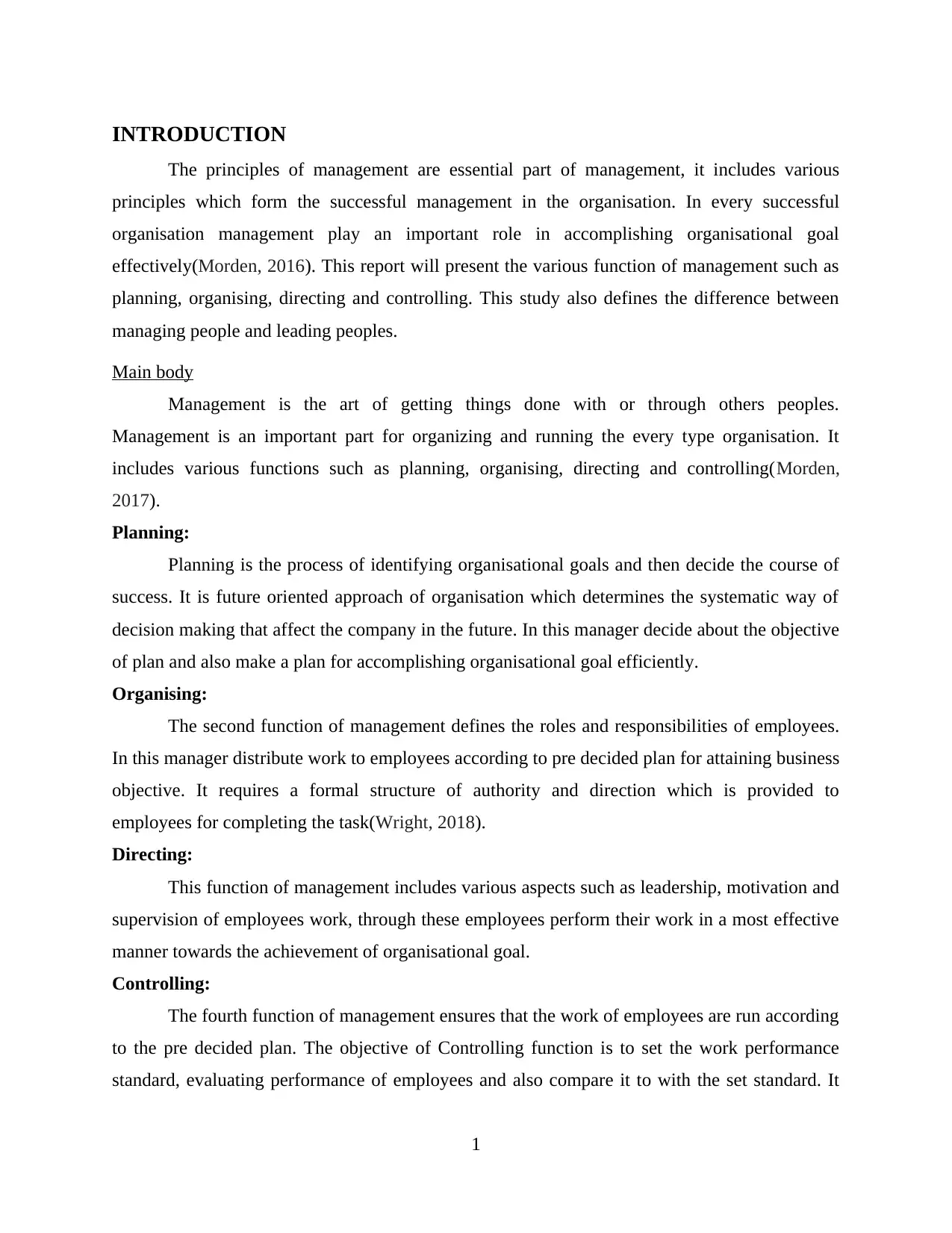Report on Management Principles and Leading Employees in Organizations
VerifiedAdded on 2020/12/18
|5
|695
|51
Report
AI Summary
This report provides an overview of the principles of management and their significance in achieving organizational goals. It outlines the core functions of management, including planning, organizing, directing, and controlling, emphasizing their roles in effective management. The report defines each function and highlights their contribution to organizational success. Furthermore, it differentiates between managing and leading employees, clarifying their respective roles and importance in achieving objectives. The conclusion underscores the vital role of these functions and the distinction between managing and leading in driving productivity and profitability within an organization. The report references various books, journals, and online resources to support its content.

Principles of management
Paraphrase This Document
Need a fresh take? Get an instant paraphrase of this document with our AI Paraphraser

Table of Contents
INTRODUCTION...........................................................................................................................1
Main body...................................................................................................................................1
CONCLUSION ...............................................................................................................................2
REFERENCES ...............................................................................................................................3
INTRODUCTION...........................................................................................................................1
Main body...................................................................................................................................1
CONCLUSION ...............................................................................................................................2
REFERENCES ...............................................................................................................................3

INTRODUCTION
The principles of management are essential part of management, it includes various
principles which form the successful management in the organisation. In every successful
organisation management play an important role in accomplishing organisational goal
effectively(Morden, 2016). This report will present the various function of management such as
planning, organising, directing and controlling. This study also defines the difference between
managing people and leading peoples.
Main body
Management is the art of getting things done with or through others peoples.
Management is an important part for organizing and running the every type organisation. It
includes various functions such as planning, organising, directing and controlling(Morden,
2017).
Planning:
Planning is the process of identifying organisational goals and then decide the course of
success. It is future oriented approach of organisation which determines the systematic way of
decision making that affect the company in the future. In this manager decide about the objective
of plan and also make a plan for accomplishing organisational goal efficiently.
Organising:
The second function of management defines the roles and responsibilities of employees.
In this manager distribute work to employees according to pre decided plan for attaining business
objective. It requires a formal structure of authority and direction which is provided to
employees for completing the task(Wright, 2018).
Directing:
This function of management includes various aspects such as leadership, motivation and
supervision of employees work, through these employees perform their work in a most effective
manner towards the achievement of organisational goal.
Controlling:
The fourth function of management ensures that the work of employees are run according
to the pre decided plan. The objective of Controlling function is to set the work performance
standard, evaluating performance of employees and also compare it to with the set standard. It
1
The principles of management are essential part of management, it includes various
principles which form the successful management in the organisation. In every successful
organisation management play an important role in accomplishing organisational goal
effectively(Morden, 2016). This report will present the various function of management such as
planning, organising, directing and controlling. This study also defines the difference between
managing people and leading peoples.
Main body
Management is the art of getting things done with or through others peoples.
Management is an important part for organizing and running the every type organisation. It
includes various functions such as planning, organising, directing and controlling(Morden,
2017).
Planning:
Planning is the process of identifying organisational goals and then decide the course of
success. It is future oriented approach of organisation which determines the systematic way of
decision making that affect the company in the future. In this manager decide about the objective
of plan and also make a plan for accomplishing organisational goal efficiently.
Organising:
The second function of management defines the roles and responsibilities of employees.
In this manager distribute work to employees according to pre decided plan for attaining business
objective. It requires a formal structure of authority and direction which is provided to
employees for completing the task(Wright, 2018).
Directing:
This function of management includes various aspects such as leadership, motivation and
supervision of employees work, through these employees perform their work in a most effective
manner towards the achievement of organisational goal.
Controlling:
The fourth function of management ensures that the work of employees are run according
to the pre decided plan. The objective of Controlling function is to set the work performance
standard, evaluating performance of employees and also compare it to with the set standard. It
1
⊘ This is a preview!⊘
Do you want full access?
Subscribe today to unlock all pages.

Trusted by 1+ million students worldwide

also takes corrective actions whenever needed(Four Functions of Management: Planning,
Organizing, Leading & Controlling, 2017).
Difference between managing and leading employees
Managing employees refers to those employees which are essential part of management.
Managing employee focus on how task can completed in the effective manner. The main aim of
Managing employees is to systematic organise and coordinate things in efficient way towards the
attainment of business objective.
Leading employees play an important role in the attainment of organisational goals
because Leading employees focus on prioritising resources and establishing resources for
accomplishing task. Leading employees inspire their team members to work in better manner.
They also guide and direct the employees to work together in the achievement of business
objective(Morden, 2016).
Yes I will manage and lead the employees in the organisation for the accomplishment of
business objective in the best and effective manner. With the help of management functions,
every type of organisation can run in the successful manner in terms of high productivity and
profitability. Leading capability also play an important role in guiding and directing employees
towards the attainment of companies goal(Wright, 2018).
CONCLUSION
The above study defines the various functions of management such as planning,
organising, directing and controlling. All of this function plays significant role in the
achievement of organisational goals. This study was also presents the difference between
managing employee and leading employee, which defines both of this employee has the main
aim that is accomplishing organisational goal.
2
Organizing, Leading & Controlling, 2017).
Difference between managing and leading employees
Managing employees refers to those employees which are essential part of management.
Managing employee focus on how task can completed in the effective manner. The main aim of
Managing employees is to systematic organise and coordinate things in efficient way towards the
attainment of business objective.
Leading employees play an important role in the attainment of organisational goals
because Leading employees focus on prioritising resources and establishing resources for
accomplishing task. Leading employees inspire their team members to work in better manner.
They also guide and direct the employees to work together in the achievement of business
objective(Morden, 2016).
Yes I will manage and lead the employees in the organisation for the accomplishment of
business objective in the best and effective manner. With the help of management functions,
every type of organisation can run in the successful manner in terms of high productivity and
profitability. Leading capability also play an important role in guiding and directing employees
towards the attainment of companies goal(Wright, 2018).
CONCLUSION
The above study defines the various functions of management such as planning,
organising, directing and controlling. All of this function plays significant role in the
achievement of organisational goals. This study was also presents the difference between
managing employee and leading employee, which defines both of this employee has the main
aim that is accomplishing organisational goal.
2
Paraphrase This Document
Need a fresh take? Get an instant paraphrase of this document with our AI Paraphraser

REFERENCES
Books and journals
Morden, T., 2016. Principles of strategic management. Routledge.
Morden, T., 2017. Principles of management. Routledge.
Wright, P., 2018. Fundamentals of human resource management. Management. 5. p.27.
Online references
Four Functions of Management: Planning, Organizing, Leading & Controlling, 2017.
[ONLINE] Available through<https://study.com/academy/lesson/four-functions-of-
management-planning-organizing-leading-controlling.html>
3
Books and journals
Morden, T., 2016. Principles of strategic management. Routledge.
Morden, T., 2017. Principles of management. Routledge.
Wright, P., 2018. Fundamentals of human resource management. Management. 5. p.27.
Online references
Four Functions of Management: Planning, Organizing, Leading & Controlling, 2017.
[ONLINE] Available through<https://study.com/academy/lesson/four-functions-of-
management-planning-organizing-leading-controlling.html>
3
1 out of 5
Related Documents
Your All-in-One AI-Powered Toolkit for Academic Success.
+13062052269
info@desklib.com
Available 24*7 on WhatsApp / Email
![[object Object]](/_next/static/media/star-bottom.7253800d.svg)
Unlock your academic potential
Copyright © 2020–2026 A2Z Services. All Rights Reserved. Developed and managed by ZUCOL.





